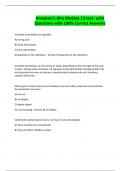Knewtons alta module 13 - Study guides, Class notes & Summaries
Looking for the best study guides, study notes and summaries about Knewtons alta module 13? On this page you'll find 5 study documents about Knewtons alta module 13.
All 5 results
Sort by
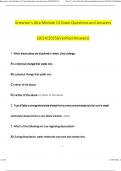
-
KNEWTON'S ALTA MODULE 13 EXAM WITH QUESTIONS AND ANSWERS
- Exam (elaborations) • 46 pages • 2024
-
- $9.99
- + learn more
KNEWTON'S ALTA MODULE 13 EXAM WITH QUESTIONS AND ANSWERS KNEWTON'S ALTA MODULE 13 EXAM WITH QUESTIONS AND ANSWERS KNEWTON'S ALTA MODULE 13 EXAM WITH QUESTIONS AND ANSWERS KNEWTON'S ALTA MODULE 13 EXAM WITH QUESTIONS AND ANSWERS KNEWTON'S ALTA MODULE 13 EXAM WITH QUESTIONS AND ANSWERS KNEWTON'S ALTA MODULE 13 EXAM WITH QUESTIONS AND ANSWERS KNEWTON'S ALTA MODULE 13 EXAM WITH QUESTIONS AND ANSWERS KNEWTON'S ALTA MODULE 13 EXAM WITH QUESTIONS AND ANSWERS KNEWTON'S ALTA MODULE 13 EX...
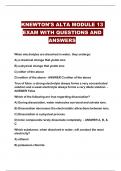
-
KNEWTON'S ALTA MODULE 13 EXAM WITH QUESTIONS AND ANSWERS
- Exam (elaborations) • 25 pages • 2024
- Available in package deal
-
- $12.49
- + learn more
KNEWTON'S ALTA MODULE 13 EXAM WITH QUESTIONS AND ANSWERS...
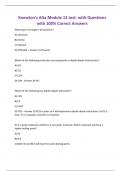
-
Knewton's Alta Module 13 test- with Questions with 100% Correct Answers
- Exam (elaborations) • 22 pages • 2024
-
- $12.99
- + learn more
What type of change is dissociation? A) Chemical B) Kinetic C) Physical D) Enthalpic - Answer C) Physical Which of the following molecules can participate in dipole-dipole interactions? A) HCl B) Cl2 C) CCl4 D) CH4 - Answer A) HCl
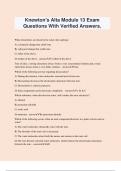
-
Knewton's Alta Module 13 Exam Questions With Verified Answers.
- Exam (elaborations) • 17 pages • 2024
- Available in package deal
-
- $12.49
- + learn more
Knewton's Alta Module 13 Exam Questions With Verified Answers. When electrolytes are dissolved in water, they undergo: A) a chemical change that yields ions B) a physical change that yields ions C) either of the above D) neither of the above - answerC) either of the above True of false: a strong electrolyte always forms a very concentrated solution and a weak electrolyte always forms a very dilute solution. - answerFalse Which of the following are true regarding dissociation? A) Durin...
Knewton's Alta Module 13 test- with Questions with 100% Correct Answers

Study stress? For sellers on Stuvia, these are actually golden times. KA-CHING! Earn from your study resources too and start uploading now. Discover all about earning on Stuvia

